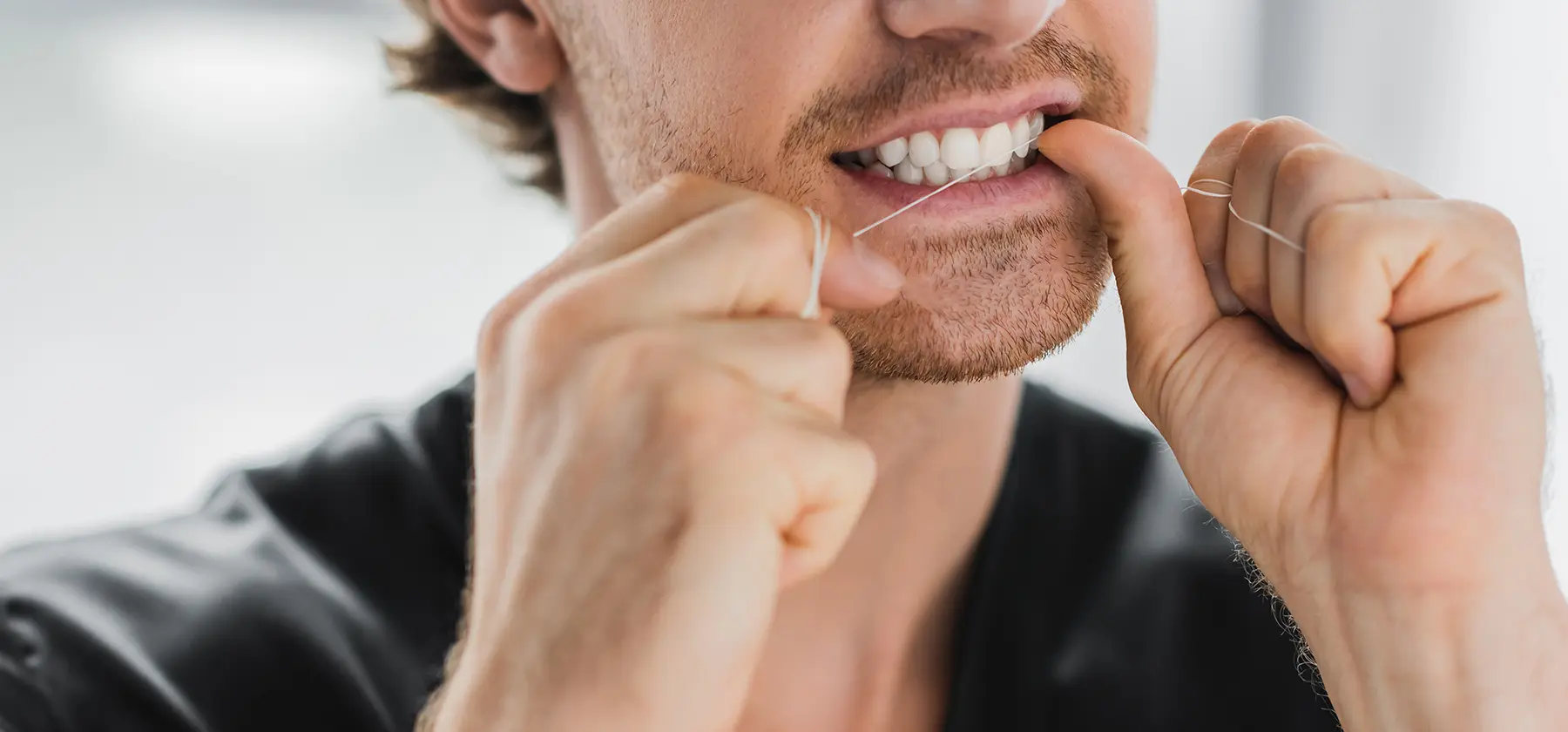
Why Does It Smell Bad When I Floss?
Reviewed by Dr. David Sentelle, DMD, PhD, MPH
Reading time: five minutes.
Have you ever noticed a bad smell while flossing? Don’t worry, you are not the only one!
Many people experience this, and you would be surprised at how often we get asked: Why does it smell bad when I floss?
The odor is usually a sign that bacteria, plaque, and food particles have been sitting between your teeth for too long. Ignoring it could lead to bigger dental problems like gum disease, periodontal disease, and cavities.
In this blog, we will explain why flossing is so important, how to do it correctly, and when kids should start flossing.
Table of Contents
Key Takeaway
If it smells bad when you floss, it is usually due to bacteria, plaque buildup, and trapped food particles decomposing between your teeth. This is a good indication that your oral hygiene needs some work.
Why Flossing Is Essential for a Healthy Mouth
Brushing alone is not enough to keep bacteria at bay.
Your toothbrush cannot reach the tight spaces between your teeth where plaque and oral bacteria build up. If these particles are not removed, they start to decompose, leading to bad breath and potential infections.
Here are a few reasons why flossing is so important:
- Removes trapped food: Tiny food particles can get stuck between your teeth and break down, causing an unpleasant smell.
- Eliminates bacteria: Bacteria thrive in tight spaces and produce sulfur compounds, which cause bad breath.
- Prevents plaque buildup: If not removed, plaque hardens into tartar, which can lead to gum disease and other oral health issues.
- Reduces the risk of cavities: Flossing protects areas that brushing alone cannot clean.
- Improves overall breath: A fresh and clean mouth starts with a complete oral hygiene routine.
What Causes the Bad Smell When You Floss?
If it smells bad when you floss, it is likely due to one or more of these reasons:
- Food debris: Leftover food trapped between teeth will eventually decay and produce a foul smell.
- Bacteria buildup: When bacteria feed on food particles, they release sulfur compounds that cause an unpleasant odor.
- Gum disease: If your gums bleed while flossing and your floss smells bad, it could be a sign of gingivitis, periodontal disease, or periodontitis.
- Tooth decay: Cavities create hiding places for bacteria, leading to a persistent bad odor.
- Dry mouth: Saliva helps wash away food and bacteria. If you have dry mouth, you may experience more plaque buildup and odor-causing bacteria.
How to Floss the Right Way for a Healthier Smile
Using the right flossing technique helps clear away plaque and food debris, keeping your child’s teeth and gums clean and cavity-free.
- Use about 18 inches of floss: Wrap most of it around your fingers, leaving a few inches to work with.
- Gently slide the floss between your teeth: Avoid snapping it down, as this can damage your gums.
- Curve the floss around each tooth: Make a C-shape to clean just under the gumline.
- Use a clean section for each tooth: This prevents spreading odor-causing bacteria from one spot to another.
- Floss daily: Consistent flossing is key to preventing plaque and bad breath after flossing.
When Should Kids Start Flossing?
Children should start flossing as soon as two teeth touch.
You should help your child floss until they develop the dexterity to do it themselves, usually by age 6 or 7.
Teaching kids proper flossing habits early helps prevent cavities and sets them up for a lifetime of good oral hygiene practices.
The Importance of Regular Dental Cleanings
Even with the best oral hygiene practices at home, professional dental cleanings are necessary
A dental cleaning removes plaque buildup, tartar, and bacteria that regular brushing and flossing cannot eliminate.
- Prevents gum disease: Regular cleanings reduce the risk of gum inflammation and periodontal disease.
- Reduces bad breath: Professional cleaning helps remove odor-causing bacteria and food particles from hard-to-reach areas.
- Protects against cavities: Removing tartar buildup lowers the chance of tooth decay and other oral health issues.
- Maintains fresh breath: A thorough cleaning ensures a fresh and healthy oral cavity.
Freshen Your Breath with Flossing
If you notice a bad smell when you floss, it is a sign that an accumulation of bacteria and food particles are lingering between your teeth.
Flossing daily is the best way to prevent bad breath and protect your dental health.
If you notice persistent bad breath or gum issues, schedule a visit with Lonestar Kid’s Dentistry for a professional cleaning and exam.
To book an appointment at our pediatric dental office in Prosper, TX, call (469) 228-4402 or visit us at 240 S. Preston Road, Suite 10, Prosper, TX.
📍Other locations
Lonestar Kid’s Dentistry in Frisco, TX
Lonestar Kid’s Dentistry in McKinney, TX
FAQs About Flossing
Flossing once a day is enough. Over-flossing or being too aggressive can damage your gums.
Floss before brushing! Flossing first helps remove plaque and food particles from between your teeth, making it easier for fluoride from your toothpaste to reach those areas when you brush. This leads to better cavity prevention and overall oral health. However, if brushing first works better for your child’s routine, that’s okay too! The important thing is that they are flossing daily.
Bleeding gums while flossing is often a sign of gum inflammation (gingivitis), which happens when plaque builds up along the gumline. It can also occur if you’re flossing too aggressively or just starting a new flossing routine. Keep flossing, use gentle, sliding motions, and see your dentist if bleeding persists for more than a week.
Try floss picks, water flossers, or interdental brushes. The goal is to remove plaque and odor-causing compounds, no matter which tool you use.
Use an antibacterial mouthwash and a tongue scraper, and maintain regular flossing habits to freshen your breath and eliminate odors after flossing.
